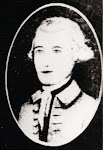Editor’s Note: This biographical reference is copied
verbatim from Pennsylvania, The
Colonial Years, 1681-1776 by Joseph J. Kelly, Jr., published by
Doubleday & Company, Inc., Garden City, New York, pp. 140-141.
As 1714 drew
to a close, Philadelphia had a first-class scandal which triggered a “great
tumult.” Rev. Francis Phillips,
temporary pastor of Christ Church, was said to be boasting of having sex with
some of the leading ladies of the congregation.
Most of the parishioners, including Gookin, thought Phillips was being
maligned, but a sizable minority believed the tales were true. Writs were obtained against him by Collector
John Moore, father of one, and Councilor Trent, husband of another. Peter Evans, brother of the former Governor,
was the Sheriff, and an ardent suitor of Miss Moore. Incensed, he arrested the cleric as he was
going to bed, presumably alone, on Saturday, February 12, 1715, dragging him,
sans stockings, through the cold night to the jail a half mile away, and there
refusing to let him send for bail. The
next day, Sunday, some three hundred young men and boys, admirers of the
beleaguered pastor, mobbed the prison and threatened to pull it down if he was
not released. They extorted a promise he
would be returned home that night, and in retiring, tried to attack the home of
the chief informer, but Gookin dispersed them.
On Monday,
even though Phillips had been set at liberty, the mob, smashed the windows in
the Trent and Moore homes. Evans,
anxious to prove himself a worthy champion of the supposedly victimized Miss
Moore, challenged the minister to a duel with swords, and was indicted for
sending a challenge. The trial jury
returned an alternative verdict, leaving the judges to decide whether a demand
to come cinctus gladio was a
challenge or an invitation. The puzzled
court took it under advisement and no further record of the case appears. Phillips, who ignored Evans’ note on March
10, faced more trouble on March 17 when other clergymen petitioned the Bishop
of London to remove him, after having failed to persuade him to leave the
Province. In the meantime he drew large
crowds to Christ Church while the Moore and Trent families attended services in
the courthouse.
For Quaker
politicians, always happy at the discomfiture of the “steeple-church” people,
the episode had too much potential to let die.
They brought the minister before a Quaker-dominated court on charges
they claimed he already admitted. Gookin
accompanied him, immediately dismissed at least three counts, and when a
twenty-pound fine was levied on another, said: “Mr. Phillips, you may go home
if you please, I’ll forgive you your fine.”
At the next
term of court, the Constable and then the Sheriff were sent to bring him in,
but Gookin battled them with his cane, went to court, and absolved Phillips
with a proclamation.
On June 10
the Assembly expressed disappointment that “some of those who occasioned those
Tumults, in order to annoy their opposite Party, are now leveling their
Malignity against the Magistrates of this City and County, and endeavoring to
prevail with the Governor . . . that
there is no Power to bring to Trial a certain Clergyman, who is charged by
Indictment at the King’s suit, for committing Fornication. . . . We desire the Governor to consider,
that Fornication, and such like Offences which in other Places may be of
ecclesiastical Connusance, are by the Laws of this Province made triable in the
Quarter-Sessions. . . .” Tongue in
cheek, Gookin answered: “The Tumults that have hitherto happened, I have
immediately endeavored to quell, and, I hope, with good Effect; the Courts are
now Opened; the Administration of Justice is restored; and if any should appear
so audacious as to oppose the Magistrates, they shall not want my Countenance
and Assistance to suppress the Attempt. . . . I
shall exert all the Authority with which I am vested, to support . . . the
Magistrates, in the Execution of the Laws, and full Discharge of their Duty . .
.”
The amorous
Phillips, “the parson who has so long tormented this place,” in Logan’s words,
was ordered by the Bishop of London to vacate Christ Church and sailed home;
Peter Evans married Miss Moore without her father’s permission; Gookin had an argument with Joseph Wood, a
Quaker justice of the Supreme Court for the Lower Counties, and kicked him, and
in September 1715, leading citizens there appealed to the Councilors to relieve
them from the Governor’s harassment. The
letter was forward to Hannah Penn stating a change was imperative.
Editor’s Note: The “. . .” deletions are in the book, and
are not inserted by your editor.
More to come in a future post about
Charles Gookin, and John Evans (cousin of Peter Evans) who was married to
Rebecca Moore (daughter of Hon. John Moore and sister of Mary Moore).








